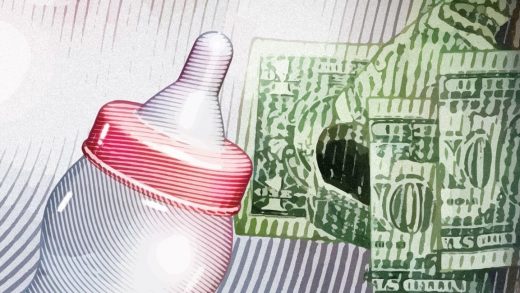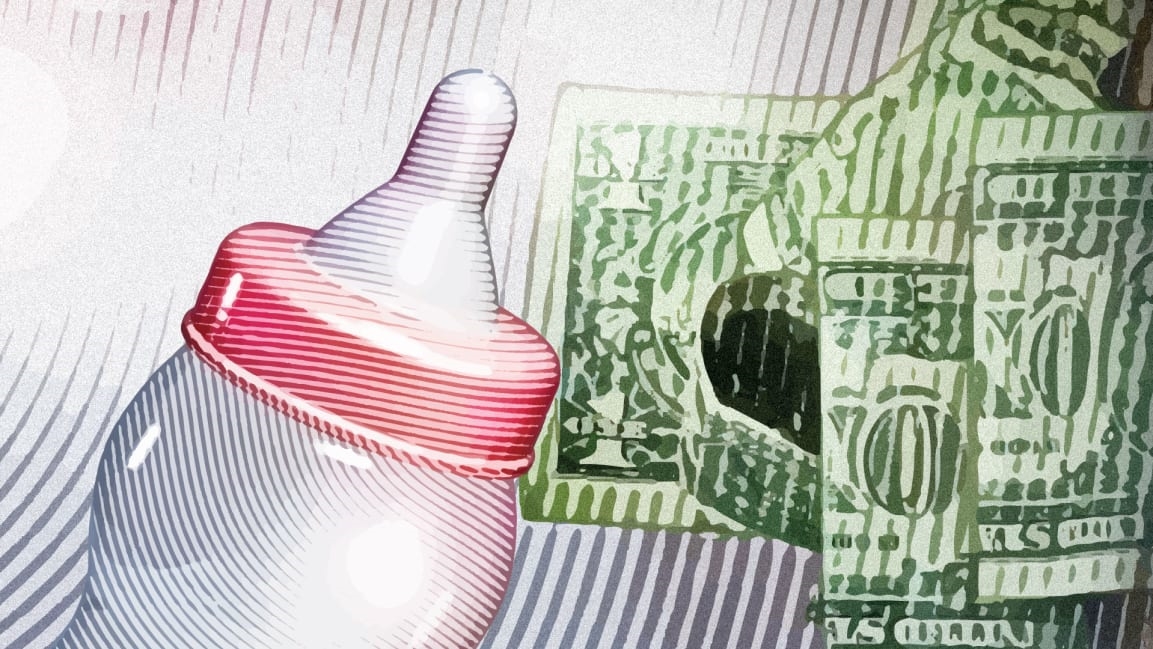With formula shortages at dire levels, it’s time for baby stimulus checks
The price of a key item has spiked to historic levels. Supply chain issues, inflation, and factors beyond consumers’ control are burning a hole in families’ pockets, in some cases putting the item out of reach entirely. The federal and state governments respond by considering a rebate that would provide some much-needed relief.
This, of course, is how America is responding to high gasoline prices. But for parents of infants facing down a frightening baby formula shortage? Crickets. Governments should immediately act to send money to parents with children under the age of 1, even as they work to solve the supply problems.
The only sustainable solution, of course, is restoring the domestic supply of formula. Existing shortages were worsened significantly by the February recall of Abbott Nutrition products. However, any major ramp-up in production will likely take months to show up – Abbott says it would take eight to ten weeks from getting approval to restart their Michigan plant before cans hit shelves — and formula is crucial nutrition for millions of babies today.
In the meantime, supply in the U.S. is low, but not zeroed out — yet many parents, particularly at the lower income brackets, are now priced out. As the New York Times reported, cans can be found on Ebay going for $120; as with any moment of scarcity, affluent families are able to throw money at the problem while lower-income families suffer. Washington Post columnist Alyssa Rosenberg writes that:
“Brian Dittmeier, senior director of public policy at the National WIC Association, said he has heard of families starting solids earlier than they would prefer, turning to risky recipes for homemade formula, or diluting formula to make it last longer even though it might not provide the nutrition babies need. Some parents, he said, are even feeding recalled formula to their children despite the risks, because it’s the only age-appropriate food they have available.”
Many stores have now begun rationing formula purchases, which hypothetically should help with access. Yet families enrolled in WIC (Women, Infant and Children) and SNAP (Supplemental Nutrition Assistance Program) are limited to a few brands, and transportation challenges may make it difficult for low-income parents to reach the few stores with cans on the shelves. Moreover, having to shell out for hyper-expensive formula (even before the shortage prices in some areas had jumped nearly 20% compared to a year ago) leaves parents with less money for other essentials like diapers or even rent.
A first response from the government, then, should be to provide funds to parents with infants. Consider it a formula rebate, a baby stimulus, whatever works. Offering, say, $250 per month until the formula shortage eases would literally save infant lives. There are only around 3.5 million children under the age of 1 in the U.S.; compared to the pandemic stimulus checks or the gas rebate plans, this isn’t a bank breaker.
There are the obvious, tired objections: what about means-testing, and also didn’t we just go through a whole mess of the expanded child tax credit expiring? To the latter argument, this would be a targeted, time-limited intervention more akin to energy rebates than a generalized child benefit. To the first, one has to be particularly heartless to think a handful of wealthy families getting a few hundred dollars is reason not to safeguard the health of infants (and the mental health of their parents).
Means-testing, as the expanded tax credit experiment bore out, inevitably leaves out those in deep poverty — exactly those parents most in need of immediate support. If means-testing ends up being a political deal-breaker, there are fairly easy levers to pull by targeting parents enrolled in WIC, SNAP, or Medicaid. Ideally, though, this type of program would be best administered via the Social Security Administration. We know which families have infants. Send them all money, and send it now.
While this is happening, there are other quick steps the administration could be taking. For instance, FDA restrictions and high tariffs mean that the U.S. has minimal access to European formula stocks. This is certainly not a cure-all — demographer Lyman Stone, who has written industry reports on formula supply, notes European countries are experiencing their own formula issues, albeit less severe — but every can helps.
Although not identical to U.S. products, there’s no reason to think British or German formula is fundamentally inferior to American brands (E.U. regulations are arguably more intensive than the FDA’s). Instituting at least a temporary authorization and tariff reduction for proven European brands could be a salve for American parents. There’s some indication this is under consideration; the FDA said in a statement Tuesday that they are “offering a streamlined import entry review process for certain products coming from foreign facilities with favorable inspection records.” Again, though, European products are expensive — parents who currently skirt FDA restrictions can pay as much as four times per ounce versus domestic brands. Money matters.
There has been much debate about America’s commitment to babies and parents over the past couple of weeks. Well, here is a clear and present danger, a chance for elected leaders to put up or shut up. Sending parents of infants money won’t solve the formula shortages, but it will offer a net to catch the babies whose bough adult failures have broken.
Elliot Haspel is a childcare policy expert and author of the book Crawling Behind: America’s Childcare Crisis and How to Fix It.
(28)



